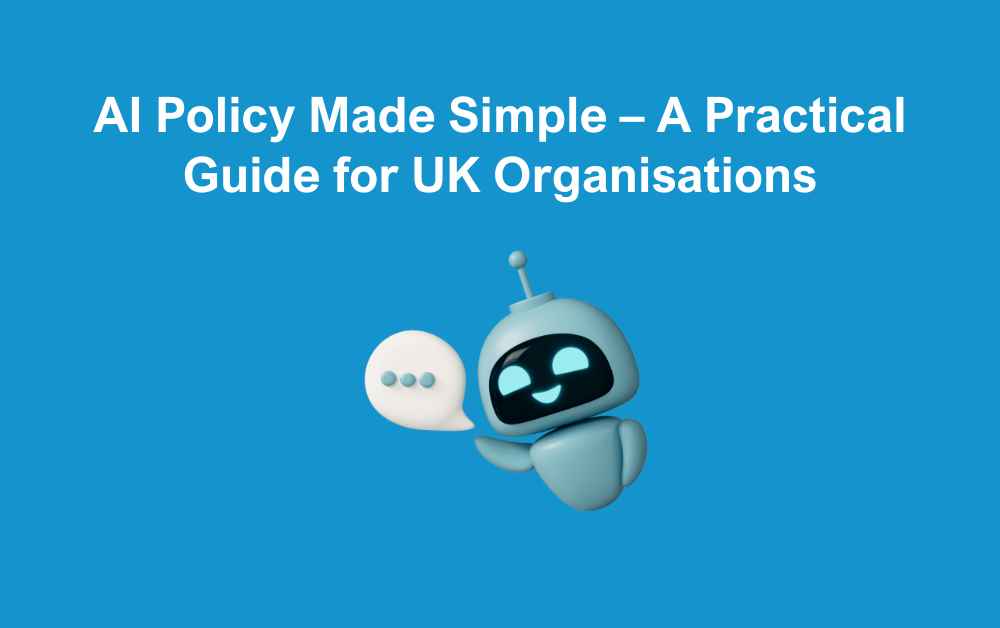As artificial intelligence (AI) continues to evolve at a rapid pace, organisations across the UK must take proactive steps to ensure they’re using AI responsibly. An effective AI policy is now essential, not only to comply with emerging regulations but also to build trust with clients, employees, and stakeholders. This practical guide breaks down what this should include and why it’s so important for UK businesses today.
Why Every Organisation Needs an AI Policy
AI is transforming how people work, from automating admin tasks to enhancing decision-making processes. AI is no longer a future concept or something to put off for another day – it’s already being used across businesses of all sizes, often without formal oversight. Now is the time to embrace the benefits of AI, but with clear provisions in place to safeguard your business. This is where an AI policy becomes essential – helping you set boundaries, manage risks, and also ensure responsible use across your organisation. Without clear guidelines, AI tools can lead to unintended bias, data breaches, or ethical concerns.
This policy helps your organisation:
- Establish clear boundaries on acceptable AI use
- Protect employee and customer data
- Promote transparency and fairness
- Prepare for future regulatory changes
- Avoid reputational damage
In short, a robust AI policy protects your business while enabling innovation.
What Should Be Included in an AI Policy?
A comprehensive AI policy should be tailored to your organisation’s size, industry, and how you use AI. However, there are core elements that every UK organisation should include:
1. Purpose and Scope
3. Ethical Principles
Outline your organisation’s commitment to fairness, transparency, accountability, and non-discrimination. Reference established frameworks such as the UK Government’s AI Ethics Guidelines.
4. Systems that can and can’t be used
Clearly state what AI systems can be utilised by staff, what form of AI is banned, and others that require permission to use. The main question that staff will have is whether systems like ChatGPT can be used. Large organisations such as Amazon have taken the decision to ban tools like ChatGPT. While this can be a helpful tool when there is limited time and resources, it can increase the risk of security and quality issues. We encourage you to consider this before allowing your team to use this freely.
5. Guidelines for Responsible AI Use
Your AI policy should outline when and how employees are permitted to use AI tools, ensuring productivity gains don’t come at the cost of quality, accuracy or ethical standards. Rather than listing every possible scenario, provide clear, practical guidance that applies across roles. This might include which tasks are appropriate for AI support (e.g. drafting routine emails), when human oversight is required (e.g. technical research or client communications), and the need to seek approval from line managers before using new tools.
Make it clear how AI-generated content can be used, and highlight the risks of relying on such outputs without proper review – such as errors, bias, or tone inconsistency. It’s also worth stating whether AI training is recommended or mandatory, particularly as many employees may not yet have the skills or understanding to use these tools responsibly and effectively.
6. Governance and Oversight
Specify who is responsible for monitoring AI use within the business. This may include appointing an AI compliance officer or forming an AI ethics committee.
7. Data Protection and Privacy
Ensure your AI policy aligns with GDPR and UK data protection laws. Detail how personal data is collected, processed, and stored by AI systems.
8. Risk Management
Include procedures for assessing the risks of AI tools before implementation. This should involve testing for bias, accuracy, and security vulnerabilities.
9. Training and Awareness
Commit to regular staff training to ensure employees understand how AI is used and how to escalate concerns. Clear communication is key to policy success.
10. Continuous Review
AI is constantly evolving. State how and when your policy will be reviewed and updated to stay relevant.
Making AI Policy Work in Practice
Having an AI policy on paper is not enough. To make it effective:
- Integrate it into your wider governance and HR frameworks
- Communicate it clearly across teams
- Embed it into procurement and onboarding processes
- Use it to guide vendor selection and due diligence
Final Thoughts
Creating a clear, practical AI policy isn’t just good practice – it’s fast becoming a business necessity. As AI technologies become embedded in more areas of work, UK organisations need policies that balance innovation with responsibility.
By taking a proactive approach now, your organisation can lead with confidence, build trust, and future proof against regulatory and reputational risks.
Need help developing an AI policy for your business?
Get in touch with our HR Experts today for practical support tailored to your organisation.







